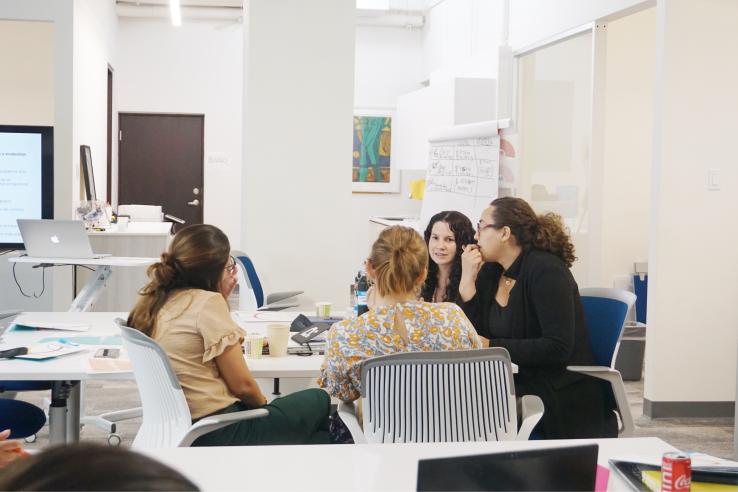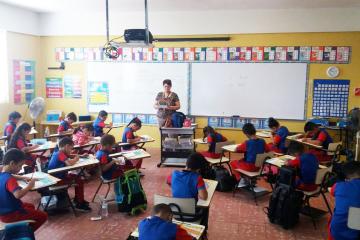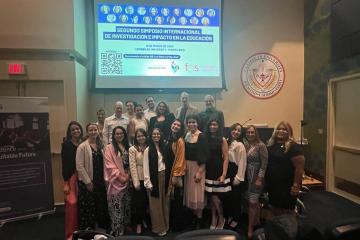
Fostering a culture of evidence-based policies in Puerto Rico

Over the past eight years, J-PAL North America has engaged with a diverse group of local partners throughout Puerto Rico to foster a culture of evidence-based policymaking to improve lives across the island. Through symposiums, conferences, and in-person engagement, Puerto Rican organizations and public agencies have demonstrated growing interest in strengthening their capacity for program evaluation, data collection, and effective data use, particularly to improve education and labor force development outcomes for their communities. J-PAL North America is committed to investing in strategies that make capacity building accessible across the island. Through our experience in Puerto Rico, we've generated insights on how to foster local partnerships, meet the needs of our stakeholders, and collaborate on local projects.
Identifying capacity-building opportunities and addressing needs
Many Puerto Rican program implementers have the desire to leverage evidence in their work to address growing issues like poverty, unemployment, housing instability, and educational inequities. However, Puerto Rico has historically experienced underinvestment in evaluation infrastructure, especially for social programs, despite local talent, expertise, and interest. Many organizations and public agencies lack the tools or resources to measure impact systematically. Barriers such as limited research funding, scarce in-person training opportunities in evaluation, and a lack of accessible data for robust analysis continue to hinder impact evaluation efforts. As a result, agencies and organizations often must implement programs without knowing their true impact.
To support this self-driven push to increase the use of evidence in social programs, in April J-PAL North America brought together over thirty members from thirteen different nonprofit and government organizations in Puerto Rico and delivered a training tailored to the Puerto Rican context, on topics including impact evaluation design, data and evidence use, and theory of change development. This training, the first Spanish-only training conducted by J-PAL North America, was the culmination of years of partnership cultivation across multiple agencies to foster a culture of evidence-based policymaking.
While different organizations may have unique evaluation needs, the training participants discussed facing many common challenges and determined that a community of practice could provide a valuable space for shared learning and collaboration. We also explored how different evaluation designs can be adjusted to local policy contexts and reflected on how interagency collaboration can play a crucial role in identifying and scaling effective projects across the island.
During the event, organizations demonstrated a strong interest in fostering local capacity to evaluate existing programs to ensure the best outcomes for the communities they serve.
Our existing work in Puerto Rico
J-PAL North America’s 2025 training builds on almost a decade of collaboration and engagement in Puerto Rico. This work began in 2017, when J-PAL North America partnered with J-PAL Latin America and the Caribbean to train the Puerto Rico Department of Education (PRDE) on key concepts of impact evaluation and evidence use. That collaboration helped lay the groundwork for further relationship building that resulted in three J-PAL-funded educational program evaluations: EDUGESPRO, ATEMA, and ACEmoción.
Through additional engagement with researchers from the Forward Society Lab and agencies on the island, we also partnered with the Department of Economic Development and Commerce’s (DDEC) Programa de Desarrollo Laboral to help develop, design, and fund the Elevating Employment Success program impact evaluation.
These evaluations were funded by J-PAL North America and included Research Management Support (RMS) to help field managers and research teams create systems and best practices to sustainably run randomized evaluations. In addition, staff from both DDEC and PRDE engaged in J-PAL’s Evaluating Social Programs (ESP) training to strengthen agency staff skills in program evaluation.
J-PAL North America also played a key role as an intermediary between implementers and researchers, fostering effective collaboration and ensuring project continuity amid turnovers and political transitions. Our ability to launch these efforts is made possible by the generous support of our funder, Arnold Ventures. Further, we have two local consultants who have supported our efforts to build and strengthen relationships with agencies across Puerto Rico.
Our plans for the future
After eight years of collaboration with organizations and public agencies in Puerto Rico, we’ve gained valuable insight into the local context. We aim to leverage this knowledge to provide ongoing, personalized support to build local capacity, such as:
- Tailored training and mentorship based on the specific needs of each agency that is interested in learning about impact evaluation using randomized evaluations, leveraging J-PAL staff and researcher expertise in evaluation design, implementation, and results dissemination.
- Access to our Economics Pathways program, a new targeted effort to empower the next generation of economists researching critical policy questions. Throughout our Pathways program, we aim to offer:
- Technical training for early career researchers: Internship and mentorship opportunities for undergraduates, training for predoctoral scholars and research staff, and advanced RCT design workshops for early to mid-career researchers.
- Funding opportunities for researchers: Financial and practical support to launch independent, high-impact research studies.
- Research Management Support (RMS) to launch randomized evaluations.
- Partnerships with universities to strengthen the capacity of local research ecosystems to conduct evaluations.
- Matchmaking opportunities with J-PAL researchers and funding opportunities through Requests for Proposals (RFPs). We will continue to connect researchers in our network with partner agencies to pursue randomized evaluations of mutual interest and apply for research funding through J-PAL’s RFPs.
- Resources and guidance on how to design randomized evaluations and collect or use existing data for research purposes.
We look forward to many more opportunities to build local capacity and cultivate a commitment to rigorous program evaluation across Puerto Rico. If you are interested in learning more or working with us, please contact Laura Ruiz-Gaona at [email protected] and Daniela Gómez Treviño at [email protected].
Visit the J-PAL Puerto Rico webpage to learn more about how we can work together to advance evidence-based policymaking across the island.



